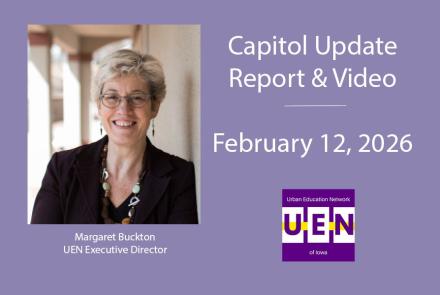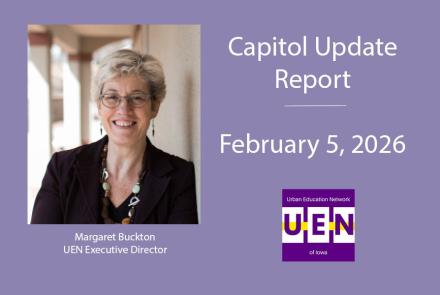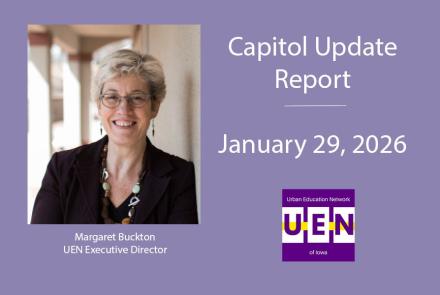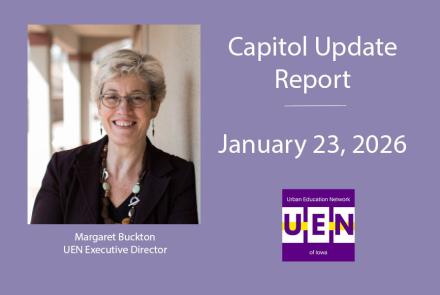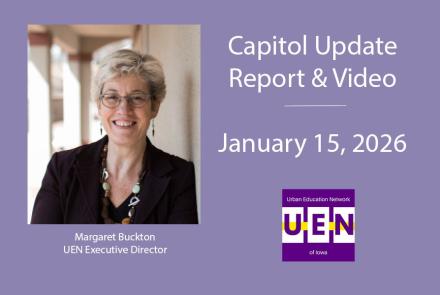Capitol Update - March 28, 2024
UEN Legislative Update
March 28, 2024
Download the Printable Version of this Weekly Report
This UEN Weekly Report from the 2024 Legislative Session includes:
- Hoover Uncommon Service Awards to Rep. Abdul-Samad and Sen. Dawson
- Governor Signs HF 2612 AEAs, SSA and Teacher Pay
- DE Director Confirmation Hearings
- Amendment Filed to HF 2618 Governor’s Early Literacy
- Tax Constitutional Amendment through the House
- Finishing the Session
- Advocacy Actions and Links to Advocacy Resources
Hoover Uncommon Service Awards
- The Uncommon Public Service Award was created by the Hoover Presidential Foundation to honor those public servants who demonstrate uncommon service to the people of Iowa above and beyond their legislative responsibilities. The awards are presented during the last week of March in the state House and Senate chambers during the morning session. Additional recognition is given at the annual Foundation Celebration Banquet in the Fall.
- The House members honored a fellow lawmaker by bestowing the Hoover Uncommon Public Service Award for 2024 to Rep. AKO Abdul-Samad.
- Senators likewise honored Sen. Dan Dawson.
Governor Signs AEAs, SSA and Teacher Pay HF 2612
HF 2612 AEA Reform moved forward, as the Senate concurred with the House Amendment on Tuesday, 30 in favor, 18 opposed, 2 absent (Republicans Brown, Klimesh and McClintock voted no with the Democrats). UEN registered in support of the final version. Governor Reynolds signed the bill on Wednesday, March 17. See the March 22 UEN Weekly Report for a breakdown of each division and the requirements in the bill. To see various fiscal impacts of each division of the bill, check out the LSA’s Fiscal Note.
The most significant changes in the bill since its introduction in January as SSB 3073 and HSB 542 follow:
- Media and Educational Services: The Governor recommended the elimination of media and education services property taxes. The bill keeps that $68 million in place, flows 40% through to AEAs, and lets districts retain up to 60% this first year. Changes to 100% under school district control beginning July 1, 2025. Districts could work with AEAs for up to all of the district amount, could use the funds for special education services or for any general fund purpose.
- Special Educational Services: The Governor recommended that school districts have authority over all AEA special education funding. This bill makes no changes for July 1, 2024, requiring all special education funding going to AEAs. Allows districts to keep up to 10% in the year beginning July 1, 2025. Requires districts to work with AEAs for the 90% and requires the remaining 10% must be spent on special education services, which could be, but is not required to be, with AEAs. There are no changes to Early Access, Child Find, or IDEA federally-funded services.
- Task Force: although not included in the Governor’s bill, the final version of HF 2612 includes an AEA Task Force of stakeholders and policymakers to review all AEA services, programs and processes and make recommendations. The AEA Task Force will meet over the Interim and make recommendations by Dec. 31, 2024. Several parts of the AEA bill are not effective until July 1, 2025, so the Task Force could recommend intervening changes. Expect continued learning about the services that AEAs provide and how school districts and AEA will work together moving forward.
- DE Division of Special Education: Governor recommended a larger Division of Special Education with 139 FTEs for oversight and school improvement. The bill specifies 13 FTEs in the DE’s Des Moines office and up to 40 staffed regionally, apportioned to AEAs by enrollment for compliance.
- Changes to AEA Staff: Various versions required mandatory removal of some AEA staff. This final version does not. (However, reduced funding means fewer AEA staff is inevitable.)
- Minimum Teacher Pay Increase: HF 2612 phases in the Governor’s teacher pay increase over two years but gets up to the $96 million for teacher pay by FY 2026. Expect the release of per pupil amounts by DOM very soon. More discussion and support among various UEN job-alike groups will follow as details unfold.
- School Funding: HF 2612 sets the SSA rate of per pupil increase of 2.5% for FY 2025. This was the Governor’s budget recommendation.
DE Director Confirmation Hearings
There are many positions in state government which are appointed by the Governor and confirmed by the Senate. Such confirmation requires a 2/3rds supermajority vote of Senators to confirm a Governor’s Nominee, which is 34 of 50 Senators. In the 2024 Legislative Session, there are 34 Republicans. The Director of the Department of Education is one of these positions. The following details the actions of the confirmation process which have taken place this week:
- The Senate’s EnBloc calendar is a batch of conferees without any issues or challenges, which is typically approved as a whole. Appointments that are challenged are removed from the EnBloc calendar, such as Dir. Snow.
- A Public Hearing was held on Tuesday, March 26, for the Subcommittee of Sens. J. Taylor, Rozenboom and Quirmbach. Public comment was received for the first half of the hour, and then Senators questioned Dir. Snow for the last half. The Subcommittee moved the confirmation forward 2:1.
- The Senate Education Committee met on Wednesday, March 27, and moved the confirmation to the Senate Calendar on party lines.
Iowa Code 256.8 sets out the expectations for the Appointment: “The governor shall appoint a director of the department of education subject to confirmation by the senate. The director shall possess a background in education and administrative experience and shall serve at the pleasure of the governor.”
The difference of opinion expressed in the public comment centered on the definition of “administrative experience and educational background.” School advocates typically believe that administrative experience means having been a principal or superintendent and educational background means having a teaching license and classroom experience. Those in support of Dir. Snow’s confirmation talked about administrative experience in two other state Departments of Education and with the federal Department of Education. Expect continued discussion about what counts as a background in education and administrative experience as the process moves forward.
Governor’s Early Literacy Bill HF 2618
An amendment was filed this week to HF 2618. The first section of the bill requires teacher preparation programs to administer the Massachusetts Foundations of Literacy Test and report the percentage of students who were above proficient, proficient and who did not achieve a passing score, and opportunities given for students to retake the test, to the DE, which is required to post the results on their web page. The amendment eliminates the provision that would have required a passing score on the test in order to graduate with the teaching degree or get a teaching license. The second section of the bill requires schools to notify parents if a student is not proficient in reading in grades K-6, must include notifying parents' of their authority to request retaining their student, and must retain the student if the parent requests. Requires the school to have a personalized reading plan for every K-6 student who is not reading proficiently, until the student is reading on grade level based on consistently proficient performance on valid and reliable measures of reading ability.
Both HF 2618 and companion SF 2195 are on their respective unfinished business calendars. UEN is registered as undecided, but requested the removal of the high-stakes nature of the test for teachers, so will encourage House members to support the amendment.
House Floor Action: Approve HJR 2006 Tax Constitutional Amendment
HJR 2006 and SJR 2003 Constitutional Amendment Income Tax: these Joint Resolutions propose a constitutional amendment to require 2/3 approval of both chambers for increasing tax rates. The House Resolution was amended to remove a provision to amend the Iowa Constitution to require a flat income tax. The resolution was amended and approved by the House, 61:35. It’s now attached to the Senate Resolution on the Senate’s Unfinished Business Calendar. UEN is opposed.
For the Iowa Constitution to be amended, the exact language in a resolution is required to be approved by the House and Senate in two consecutive biennium Sessions (the two-year time between general elections). So, if approved this Session, it would have to be approved in identical form in either the 2025 or 2026 Legislative Session, and then could be put on the ballot for voters to approve.
UEN typically opposes Constitutional amendments that will make it more difficult for future lawmakers to address budget constraints or economic downturns negatively impacting their ability to adequately fund schools. These constitutional amendments are often referred to as “TaBOR” amendments, which means Taxpayers’ Bill of Rights. The Center for Budget and Policy Priorities reported the impact on Colorado after its constitution was amended, that due to TABOR’s forced deep spending cuts, Colorado’s national rankings on a number of critical public services plummeted in the years after it adopted TABOR in 1992. Specifically, Colorado fell from 35th to 49th in the nation in K-12 spending as a percentage of personal income between 1992 and 2001.
Finishing the Session
See the March 15 UEN Weekly Report for School Start Date Status, Unfinished Business Calendar meaning and list of bills, Funnel Survivors and Dead Bills. April 16 is the last day of legislative per diem payments and they generally try to finish the Session by that time. The legislature has to debate some policy bills, if they intend to enact them. They need to get several big appropriations bills started and finished. They must approve whatever additional tax policy they intend to pass. Their plates are full. Stay attentive for the next few weeks in case some bad policies come back as amendments. Watch for moments to thank legislators for their work that supports your school district staff, students and communities.
Advocacy Actions
Share a Success Story in your School District: reach out to your Senator and Representative and share a success story of a great program helping students, a staff member going above and beyond, a student who has achieved an extraordinary achievement, a collaboration between your district and an AEA to solve a problem, or some community collaboration that is making a difference. If the story concerns quality preschool, you can easily transition to the next advocacy action.
Quality Preschool and Other UEN Priorities: Continue to talk about the value of Quality Preschool and Teacher and other Staff Shortages. SF 2383 Expanded Preschool is on the Senate Calendar but is unlikely to move forward due to the estimated impact of the bill on the state budget. The bill is phased in over two years, up to 1.0 weighting for students below 185% of the federal poverty level. Contact Senators to support it. Find Issue Briefs and other resources on the UEN Advocacy website to find talking points or other resources to share when you meet with policymakers.
Connecting with Legislators: To call and leave a message at the Statehouse during the legislative session, the House switchboard operator number is 515.281.3221 and the Senate switchboard operator number is 515.281.3371. You can ask if they are available or leave a message for them to call you back. You can also ask them what’s the best way to contact them during session. They may prefer email or text message or phone call based on their personal preferences.
Find biographical information about legislators gleaned from their election websites on the ISFIS site here: http://www.iowaschoolfinance.com/legislative_bios. Learn about your new representatives and senators or find out something you don’t know about incumbents.
Find out who your legislators are through the interactive map or address search posted on the Legislative Website here: https://www.legis.iowa.gov/legislators/find
UEN Advocacy Resources: Check out the UEN Website at www.uen-ia.org to find Issue Briefs, UEN Weekly Update Legislative Reports and Videos, UEN Calls to Action when immediate advocacy action is required, testimony presented to the State Board of Education, the DE or any legislative committee or public hearing, and links to fiscal information that may inform your work. The latest legislative actions from the Statehouse will be posted at: www.uen-ia.org/blogs-list. See the 2024 UEN Advocacy Handbook, which is also available from the subscriber section of the UEN website.
Contact us with any questions, feedback or suggestions to better prepare your advocacy work:
Margaret Buckton
UEN Executive Director
margaret@iowaschoolfinance.com
515.201.3755 Cell
Thanks to our UEN Corporate Sponsors:
Special thank you to your UEN Corporate Sponsors for their support of UEN programs and services. Find information about how these organizations may help your district on the Corporate Sponsor page of the UEN website at www.uen-ia.org/uen-sponsors.
- Public Progress LLC - thepublicprogress.com
- Solution Tree - www.solutiontree.com/st-states/iowa


